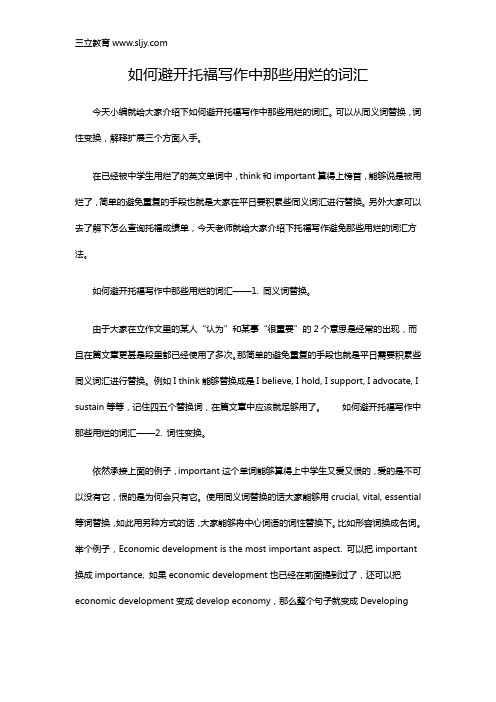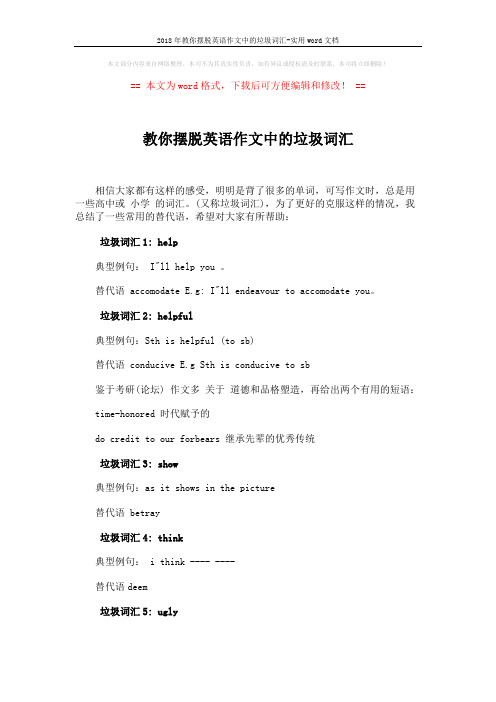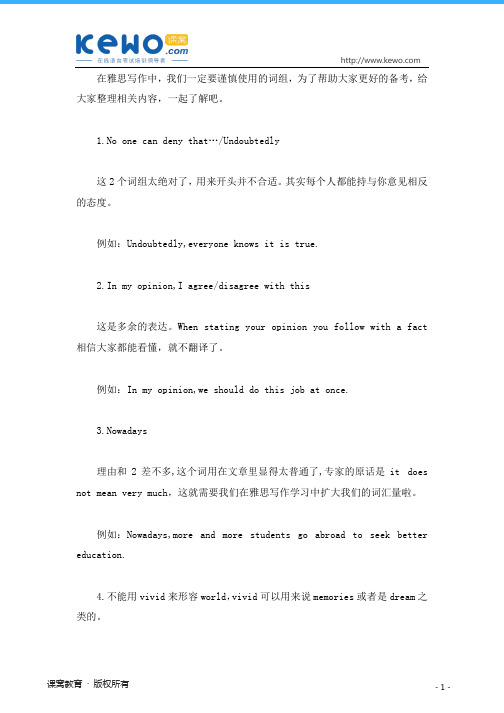英语作文要避开的“傻词”
如何避开托福写作中那些用烂的词汇

如何避开托福写作中那些用烂的词汇今天小编就给大家介绍下如何避开托福写作中那些用烂的词汇。
可以从同义词替换,词性变换,解释扩展三个方面入手。
在已经被中学生用烂了的英文单词中,think和important算得上榜首,能够说是被用烂了,简单的避免重复的手段也就是大家在平日要积累些同义词汇进行替换。
另外大家可以去了解下怎么查询托福成绩单,今天老师就给大家介绍下托福写作避免那些用烂的词汇方法。
如何避开托福写作中那些用烂的词汇——1. 同义词替换。
由于大家在立作文里的某人“认为”和某事“很重要”的2个意思是经常的出现,而且在篇文章更甚是段里都已经使用了多次。
那简单的避免重复的手段也就是平日需要积累些同义词汇进行替换。
例如I think能够替换成是I believe, I hold, I support, I advocate, I sustain等等,记住四五个替换词,在篇文章中应该就足够用了。
如何避开托福写作中那些用烂的词汇——2. 词性变换。
依然承接上面的例子,important这个单词能够算得上中学生又爱又恨的,爱的是不可以没有它,恨的是为何会只有它。
使用同义词替换的话大家能够用crucial, vital, essential 等词替换,如此用另种方式的话,大家能够将中心词语的词性替换下。
比如形容词换成名词。
举个例子,Economic development is the most important aspect. 可以把important 换成importance, 如果economic development也已经在前面提到过了,还可以把economic development变成develop economy,那么整个句子就变成Developingeconomy is attached the most importance. 想不出同义词的时候,我们可以试试能不能把中心词的词性变换下。
如何避开托福写作中那些用烂的词汇——3. 解释扩展。
英语作文隐藏用语大全

英语作文隐藏用语大全Certainly, here's a comprehensive list of euphemisms and hidden phrases commonly used in English essays:1. Economic downturn: Economic challenges or economic recession。
2. Unemployed: Between jobs or job-seeking。
3. Laid off: Downsized or let go。
4. Fat: Overweight or pleasantly plump。
5. Old: Mature or senior。
6. Death: Passed away or departed。
7. Poor: Economically disadvantaged or financially insecure。
8. Crazy: Eccentric or unique。
9. Stupid: Intellectually challenged or not thesharpest tool in the shed。
10. Drunk: Under the influence or intoxicated。
11. Addicted: Chemically dependent or struggling with substance abuse。
12. Homeless: Without a permanent residence or experiencing housing instability。
13. Criminal: Involved in illegal activities or havinga run-in with the law。
14. Lazy: Relaxed or taking it easy。
2018年教你摆脱英语作文中的垃圾词汇-实用word文档 (2页)

2018年教你摆脱英语作文中的垃圾词汇-实用word文档
本文部分内容来自网络整理,本司不为其真实性负责,如有异议或侵权请及时联系,本司将立即删除!
== 本文为word格式,下载后可方便编辑和修改! ==
教你摆脱英语作文中的垃圾词汇
相信大家都有这样的感受,明明是背了很多的单词,可写作文时,总是用一些高中或小学的词汇。
(又称垃圾词汇),为了更好的克服这样的情况,我总结了一些常用的替代语,希望对大家有所帮助:
垃圾词汇1: help
典型例句: I"ll help you 。
替代语 accomodate E.g: I"ll endeavour to accomodate you。
垃圾词汇2: helpful
典型例句:Sth is helpful (to sb)
替代语 conducive E.g Sth is conducive to sb
鉴于考研(论坛) 作文多关于道德和品格塑造,再给出两个有用的短语:
time-honored 时代赋予的
do credit to our forbears 继承先辈的优秀传统
垃圾词汇3: show
典型例句:as it shows in the picture
替代语 betray
垃圾词汇4: think
典型例句: i think ---- ----
替代语deem
垃圾词汇5: ugly。
英语作文不该出现的词语

英语作文不该出现的词语In English composition, certain words should be avoided to enhance clarity, precision, and sophistication in writing. Here's a list of words that are generally considered undesirable in English essays:1. Very: Instead of using "very," opt for stronger and more precise adjectives. For example, rather than saying "very good," you could say "excellent" or "superb."2. Thing: "Thing" is vague and lacks specificity. Try to replace it with a more precise noun that conveys the intended meaning.3. Stuff: Similar to "thing," "stuff" is imprecise and should be replaced with a more specific term.4. Good/bad: These words are oversimplified and lack nuance. Instead, use more descriptive terms to convey the exact nature of something.5. Nice: "Nice" is another vague word that lacks specificity. Choose more descriptive adjectives to convey your meaning more precisely.6. Really: Similar to "very," "really" is often unnecessary and can be replaced with stronger adjectives or adverbs.7. Like: Overusing "like" can make writing seem informal and lacking in precision. Try to express comparisons and similes more explicitly.8. Things: Like "thing," "things" is too broad and vague. Specify what you're referring to with a more precise term.9. Basically: This word often adds unnecessary filler to sentences. Try to convey your point more directly without relying on "basically."10. In conclusion: While this phrase is commonly usedto signal the end of an essay, it's often redundant. Instead, summarize your main points without explicitly stating that you're concluding.11. I think: Unless expressing personal opinion is necessary, avoid starting sentences with "I think." Instead, present your ideas with confidence.12. A lot: Replace "a lot" with a more precise quantity or description.13. Always/never: These words are too absolute andrarely reflect reality accurately. Instead, use qualifiersto convey the degree or frequency of something.14. Kind of/sort of: These phrases weaken your statements and can make you sound unsure. Be more decisivein your language.15. Just: "Just" can diminish the importance of whatyou're saying. Remove it to strengthen your statements.By eliminating these words from your English essays, you can improve clarity, precision, and overall quality of your writing. Instead, strive for specificity, nuance, and confidence in your expression.。
雅思写作最忌讳的词组有哪些?

在雅思写作中,我们一定要谨慎使用的词组,为了帮助大家更好的备考,给大家整理相关内容,一起了解吧。
1.No one can deny that…/Undoubtedly这2个词组太绝对了,用来开头并不合适。
其实每个人都能持与你意见相反的态度。
例如:Undoubtedly,everyone knows it is true.2.In my opinion,I agree/disagree with this这是多余的表达。
When stating your opinion you follow with a fact 相信大家都能看懂,就不翻译了。
例如:In my opinion,we should do this job at once.3.Nowadays理由和2差不多,这个词用在文章里显得太普通了,专家的原话是it does not mean very much,这就需要我们在雅思写作学习中扩大我们的词汇量啦。
例如:Nowadays,more and more students go abroad to seek better education.4.不能用vivid来形容world,vivid可以用来说memories或者是dream 之类的。
5.a lot of/lots of这对词组一般不要出现在雅思写作中,考官已经看烦了。
可以用 A considerable number of来代替它们。
例如:There are a lot of books in the library.There are a considerable number of books in the library.6.Recently这个词不好,按照专家的说法就是too imprecise,没有一个具体的时间。
可以用in the last five years…/since…代替。
例如:Recently,many foreigners came to China.In the last five years,many foreigners came to China.7.There is a survey……专家是这么说的:Has there been?only say this if you actually know of one,也就是说考官知道这些都是你编的,最好不要用了。
雅思写作高分避免利用的词组归纳【南通雅思英语培训】

16个雅思写作高分避免利用的词组有很多词组在雅思作文中是大家经常常利用到的,可是有一些并非适合出此刻雅思作文中。
若是大家想要自己的雅思写作拿到高分,就要注意在作文中避免利用不适当的词组。
南通沃尔得国际英语老师为大家整理了16个雅思写作高分避免利用的词组。
1. a lot of/lots of这对词组一般不要出此刻academic essay中,考官已经看烦了。
可以用Aconsiderable number of代替。
2. Everything has two sides/every coin has tow sides说了跟没说一样,明显的事实,以后也不要用了。
3. Recently这个词不好。
依照他们的说法就是too imprecise,没有一个具体的时间。
可以用In thelast 5 years…/since….代替。
4. There is survey……老师是这么说的:has there been?/only say this if you actually know of one 也就是说考官知道这些都是你编的,最好不要用了。
5. And, because, but这三个词咱们仍是常常会用到.其实最好用in addition, therefore, however等代替。
6. 不能用vivid 来形容world,vivid可以用来讲memories或是dream之类的。
7. No one can deny that…/Undoubtedly这2个词组太绝对了,用来开头并非适合。
其实每一个人都能持与你意见相反的态度。
8. in a word很多人会用它来做conclusion。
鬼佬的意见是:若是你准备用这个词组来引出你的观点,那你最好用一个词来归纳,谁让你是这么写的呢。
9. Meanwhile don’t use in general academic writing or for task 2-but it is okfor describing a process in task 110. Nowadays理由和3差不多,这个词用在文章里显得太普通了,老师的原话是it does not mean very much11. It is a well known fact…最好不要用, 有的考官会扣分。
勿用七大词,SAT写作你能拿高分
勿用七大词,SAT写作你能拿高分在SAT写作中,大家要想拿高分有7大用词是碰不得的,至于是哪七大用词,下面就看楷励教育小编来为大家一一罗列出来。
大家可以心里有个谱,在考试孩子能够要避用这些词。
第一、如果使用一个更加正式的单个动词,比其相对应的短语动词听起来更加贴切自然,最好使用正式的单个单词。
第二、避免使用个人化的或会话样式的文体格式(听起来好像正同考官聊天)。
因此,尽量不要使用词,如I, me, my, you, we, us 和our这样的单词。
虽然这些单词广泛应用于非正式用语和口语中,通常认为在正式的学术性写作中,这些单词太过个人化,太过随意。
第三、如果考生愿意,考生可以使用代词I来发表自己的看法。
但是,在开篇和文章结尾使,尽量避免I的出现。
这样,考生就可以避免使自己的文章太过个人化,具有太多的会话风格。
第四、避免使用经常在日常会话中出现的单词和短语,因为这些单词或短语不太适合应用于学术写作中。
字典中经常在这些词的前面标有“informal(非正式)”的标签。
考生在写作中,要使用更加正式得单词和短语。
第五、虽然在非正式的写作中,常常使用缩写单词(如:can’t,won’t,shouldn’t 和hasn’t),但考试一定要避免在正式的学术写作中出现类似的缩写单词。
第六、避免在正式的学术写作中使用缩略语。
不要写yrs,e.g。
这样的单词(分别代表原始的拉丁文中的exempli gratia和“for example(例如)”的意思)。
也不要使用i.e. (原始的拉丁文id est的缩略语,意为“that is(也就是)”)。
而应该写出这些单词相对应的形式(years,for example 和that is)。
第七、不要使用口语化的英语或俚语。
口语化的英语是一种非正式的英语类型,它包括词像gonna 或wanna这样的缩写单词,还有例如ain’t nothin’和dead as a doornail这样的短语。
- 1、下载文档前请自行甄别文档内容的完整性,平台不提供额外的编辑、内容补充、找答案等附加服务。
- 2、"仅部分预览"的文档,不可在线预览部分如存在完整性等问题,可反馈申请退款(可完整预览的文档不适用该条件!)。
- 3、如文档侵犯您的权益,请联系客服反馈,我们会尽快为您处理(人工客服工作时间:9:00-18:30)。
英语作文要避开的“傻词” 学英文的轨迹是这样的。先什么都不会,能写出来就不错;后来会点词就拼命装X结果不得要领;后来知道简洁为好,能表达出意思就够,最NB的就是知道什么时候用什么词,对词义的差别掌握的很透彻,句式很多样,native speaker能很自然的看懂并欣赏。这一级别需要很长时间练就,我估计一般老外都不见得那么熟练地驾驭词汇。
连词篇:(介词,副词) Firstly: previously, beforehand, foremost, initially, originally, formerly, principally, mainly, essentially, basically, generally, commonly, universally, on the whole, fundamentally, to begin with, to start with, first of all, at the outset…
Then: subsequently, afterward, thereafter, after that, succeeding (adj.), secondarily, what is more, furthermore (further more)
Lastly: ultimately, eventually, in conclusion, to conclude, as a final point, last of all, last but not least, finally…
Too: as well (句末), in addition, besides, moreover, additionally, to boot, excessively, also…
And: plus, as well as, along with, in addition, bonus, with… +Or: otherwise, if not, before, or else… So (adv): therefore, thus, consequently, accordingly, as a result, for that reason, hence, that’s why
Because: as, due to, since, as to, in that, for the reason that, for, now that…
But:however, moreover, nevertheless, nonetheless, on the contrary, on the other hand, 让步although, even thought, though, even if, while, as, despite the fact that…
Only: just, merely, barely, singly, solely, rarely… Without: excluding, Very: extremely, acutely, decidedly, deeply, exceedingly, greatly, highly, uncommonly, profoundly, unusually… Actually: as a matter of fact, indeed, in fact, in point of fact, in reality, in truth, literally, truly …
形容词/副词 Important: essential, significant, vital, crucial, profound, play a pushing role,indispensable, requisite, critical, fundamental, primary, elementary, underlying, rudimentary, basically, necessary…
-附加-傻句替换:I think that A is more important than B. (这是经典大傻句!以下句中的'important'可随意替换同义词)
1. A is important to B. 2. A plays an/aimportant role to B. 3. A is of (great\enormous\significant\awesome) to B. 4. B can not (live\developed\grow\survive\achieve) without A. 5. A means (a lot\a great deal\much) to B. 6. The importance of A (to B) can never be (exaggerated\denied\ignored\doubted).
7. A is everything/the whole world to B. 8. B is fundamental on A. 9. A matters/counts to B. 10. Nothing is more crucial to B than A. 11. A is to B what the (foundation is to a skyscraper\water is to fish\the heart is to a human)
Big: gigantic, massive, colossal, enormous, immense, gargantuan, tremendous, titanic, giant, vast, large, huge, monster, bulky,
->many: numerous, myriad, infinite, ->forever (adv): infinity, eternal, timeless, everlasting,undying, endless, changeless, perpetually…
Small: minimum, diminutive, minute, petite, wee, undersized, teeny, tiny, little, petite(女子身高娇小) Good: marvelous, fabulous, gorgeous, spectacular, outstanding, distinguished, remarkable, superb, incredible, unbelievable, out of this world, magnificent, charming, stunning, fantastic, terrific, excellent, great, wonderful, amazing, awesome
Bad: awful, terrible, dreadful, defective, faulty, imperfect, inadequate, poor, substandard, unsatisfactory, harmful, damaging, deleterious, detrimental, hurtful, ruinous, unhealthy, evil, immoral…
Clever: brilliant, knowledgeable, intellectual, intelligent, excellent, bright, smart
Happy: delightful, delectable, elated, glad, overjoyed, pleased, jubilant, merry, joyful,
Beautiful: charming, charismatic, attractive, gorgeous, pretty, endearing, sweet, adorable, eye-catching, handsome, hot, cute, good-looking, lovable, engaging…
Fast:swift, quick, rapid, speedy, hasty, nippy, like lightning, +hurry (v): hustle, rush, make haste, tear, step on it, dash, get a move on, step on it, scoot.
Easy: simple, effortless, no trouble, painless, plain sailing, uncomplicated, undemanding, unproblematic, a piece of cake (informal), child’s play (informal),…
Clear: obvious, apparent, blatant, comprehensible, conspicuous, distinct, evident, manifest, palpable, plain, pronounced, recognizable, transparent, intelligible, lucid, plain, understandable, uninvolved, simple, …
Direct: bald, basic, frank, naked, plain, sincere, stark, straightforward, candid, forthright, outspoken….
Difficult: hard, tricky, complicated, complex, intricate, involved, knotty, perplexing, puzzling, thorny…
Angry: annoyed, cross, displeased, enraged, exasperated, incensed, infuriated, irate, mad (informal), livid (informal), berserk, outraged, resentful...
Dangerous: perilous, breakneck, chancy (informal), hazardous, insecure, precarious, risky, unsafe, vulnerable
